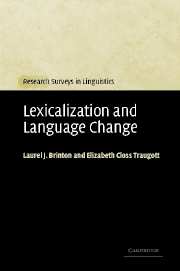96 results
Aneider Iza Erviti, Discourse constructions in English: Meaning, form, and hierarchies (Yearbook of Corpus Linguistics and Pragmatics). Cham: Springer, 2021. Pp. xiv + 164. ISBN 9783030716790 (hb), 9783030716806 (e-book).
-
- Journal:
- English Language & Linguistics / Volume 27 / Issue 4 / December 2023
- Published online by Cambridge University Press:
- 09 March 2023, pp. 849-854
-
- Article
- Export citation
Chapter 4 - Are Comparative Modals Converging or Diverging in English? Different Answers from the Perspectives of Grammaticalisation and Constructionalisation
- from Part I - Approaches to Grammatical Categories and Categorial Change
-
-
- Book:
- Categories, Constructions, and Change in English Syntax
- Published online:
- 07 October 2019
- Print publication:
- 10 October 2019, pp 105-129
-
- Chapter
- Export citation
Chapter 2 - Symbol of Powerlessness and Degeneracy, or Symbol of Solidarity and Truth?
-
-
- Book:
- Variation, Versatility and Change in Sociolinguistics and Creole Studies
- Published online:
- 22 January 2019
- Print publication:
- 24 January 2019, pp 31-47
-
- Chapter
- Export citation
‘Insubordination’ in the light of the Uniformitarian Principle
-
- Journal:
- English Language & Linguistics / Volume 21 / Issue 2 / July 2017
- Published online by Cambridge University Press:
- 07 July 2017, pp. 289-310
-
- Article
- Export citation
26 - Non-syntactic Sources and Triggers of Syntactic Change
- from Part V - Explanations
-
-
- Book:
- The Cambridge Handbook of Historical Syntax
- Published online:
- 28 April 2017
- Print publication:
- 09 March 2017, pp 556-578
-
- Chapter
- Export citation
22 - Identifying micro-changes in a particular linguistic change-type: the case of subjectification
- from Section 4 - Highlighting the research process
-
-
- Book:
- The Cambridge Handbook of English Historical Linguistics
- Published online:
- 05 May 2016
- Print publication:
- 03 May 2016, pp 376-389
-
- Chapter
- Export citation
Geoffrey Leech, Marianne Hundt, Christian Mair and Nicholas Smith, Change in contemporary English: A grammatical study. Cambridge: Cambridge University Press, 2009. Pp. xxviii + 341. ISBN 978-0-521-86722-I.
-
- Journal:
- English Language & Linguistics / Volume 16 / Issue 1 / March 2012
- Published online by Cambridge University Press:
- 17 February 2012, pp. 183-193
-
- Article
- Export citation
27 - Pragmatics and language change
- from Part III - Interfaces and the delimitation of pragmatics
-
-
- Book:
- The Cambridge Handbook of Pragmatics
- Published online:
- 05 June 2012
- Print publication:
- 12 January 2012, pp 549-566
-
- Chapter
- Export citation
Contributors
-
-
- Book:
- The Cambridge Handbook of Pragmatics
- Published online:
- 05 June 2012
- Print publication:
- 12 January 2012, pp viii-ix
-
- Chapter
- Export citation
The sociolinguistics of a short-lived innovation: Tracing the development of quotative all across spoken and internet newsgroup data
-
- Journal:
- Language Variation and Change / Volume 22 / Issue 2 / July 2010
- Published online by Cambridge University Press:
- 09 November 2010, pp. 191-219
- Print publication:
- July 2010
-
- Article
- Export citation
Scope and the development of epistemic modality: evidence from ought to
-
- Journal:
- English Language & Linguistics / Volume 1 / Issue 2 / November 1997
- Published online by Cambridge University Press:
- 12 September 2008, pp. 295-317
-
- Article
- Export citation
Richard Hogg and David Denison (eds.), A history of the English language, Cambridge: Cambridge University Press. 2006, ISBN 0-521-66227-3 Lynda Mugglestone (ed.), The Oxford history of English. Oxford and New York: Oxford University Press. 2006, ISBN-13: 978-0-19-924931-2, ISBN-10: 0-19-924931-8
-
- Journal:
- English Language & Linguistics / Volume 11 / Issue 3 / November 2007
- Published online by Cambridge University Press:
- 14 November 2007, pp. 590-601
-
- Article
- Export citation
The lady was al demonyak: historical aspects of Adverb all
-
- Journal:
- English Language & Linguistics / Volume 10 / Issue 2 / November 2006
- Published online by Cambridge University Press:
- 18 October 2006, pp. 345-370
-
- Article
- Export citation
Elly van Gelderen, Grammaticalization as economy. Linguistik Aktuell/Linguistics Today 71. Amsterdam and Philadelphia: John Benjamins, 2004. Pp. 320. ISBN 90 272 2795 0 (Eur.), 1 58811 552 6 (US)
-
- Journal:
- English Language & Linguistics / Volume 10 / Issue 1 / May 2006
- Published online by Cambridge University Press:
- 15 May 2006, pp. 200-208
-
- Article
- Export citation
Index of words and forms
-
- Book:
- Lexicalization and Language Change
- Published online:
- 03 February 2010
- Print publication:
- 27 October 2005, pp 194-207
-
- Chapter
- Export citation
List of abbreviations
-
- Book:
- Lexicalization and Language Change
- Published online:
- 03 February 2010
- Print publication:
- 27 October 2005, pp xi-xii
-
- Chapter
- Export citation
3 - Views on the relation of lexicalization to grammaticalization
-
- Book:
- Lexicalization and Language Change
- Published online:
- 03 February 2010
- Print publication:
- 27 October 2005, pp 62-88
-
- Chapter
- Export citation
1 - Theoretical contexts for the study of lexicalization and grammaticalization
-
- Book:
- Lexicalization and Language Change
- Published online:
- 03 February 2010
- Print publication:
- 27 October 2005, pp 1-31
-
- Chapter
- Export citation

Lexicalization and Language Change
-
- Published online:
- 03 February 2010
- Print publication:
- 27 October 2005

